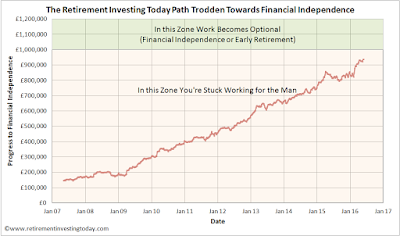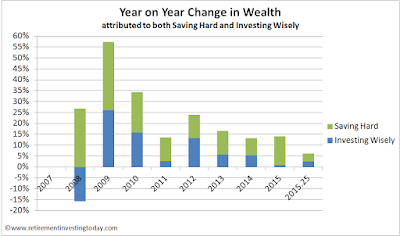
Quarter 1 has been what can only be described as one where the rocket boosters fired and subsequently propelled my personal finances forward at a rapid rate of knots. I passed
the one year to FIRE (financially independent retired early) mark during the quarter and then finished the quarter with wealth addition of some £55,000! To put that into perspective that is more than half of what I achieved through
the whole of last year. Positively both my Saving Hard and Investing Wisely approaches made strong contributions:
Click to enlarge, RIT Year on Year Change in Wealth (Saving Hard + Investing Wisely)
SAVE HARD
I define Saving Hard a little differently than most personal finance bloggers. For me it’s Gross Earnings (ie before taxes, a crucial difference) plus Employee Pension Contributions minus Spending minus Taxes. Earn more and one is winning. Spend less or pay less taxes and you’re also winning. Savings Rate is then Saving Hard divided by Gross Earnings plus Employee Pension Contributions. To make it a little more conservative Taxes include any taxes on investments but Earnings include no investment returns. This encourages me to continually look for the most tax efficient investment methods.
Even with a large portion of my bonus
going to those better able to spend it, including HMRC, I was still able to save some £31,000. This was possible by once again keeping spending nicely in control. In fact my personal rate of inflation (ex taxes) compared to Q1 2015 was actually -7%. An interesting dynamic has developed here. With FIRE being so close my better half and I seem to have just sub-consciously battened down the hatches as we can see the finish line which is then self-fulfilling.
Combining Earnings, Spending and Taxes together results in an average Savings Rate of 48% for quarter 1 against a plan of 55%. Sounds like a pretty poor effort until I also mention HMRC took 47%, including some back taxes, with us living off the remainder.
Click to enlarge, RIT Savings Rate
Saving Hard score: Conceded Pass. I yet again missed my savings plan of 55% but against a back drop of back taxes I’ll take it. Savings were also still able to add 3.6% to my wealth, which is not to be sniffed at, even at this late stage of my journey. Savings also continues to make the biggest contribution towards my wealth accumulation with 67% now having come from savings and only 33% from investments.
Compound interest is still not really firing on all 4 cylinders.
INVEST WISELY
Investment return for Q1 2016 (02 January 16 to 02 April 16) was a healthy 2.8%. In 7 out of the last 8 years savings has made a greater contribution to my wealth than investments. That theme has continued into quarter 1 with my investments contributing £24,000.
 So the UK has voted, Article 50 of the 2009 Lisbon Treaty will soon be invoked and over the next couple of years we’ll negotiate (hopefully sensibly) our way out of the European Union. Of course I have no idea what those negotiations are going to result in but I also don’t really want to hang around and wait. After all I’m trying to become financially independent in less than 6 months from here and retire early to the Med in less than 12 months.
So the UK has voted, Article 50 of the 2009 Lisbon Treaty will soon be invoked and over the next couple of years we’ll negotiate (hopefully sensibly) our way out of the European Union. Of course I have no idea what those negotiations are going to result in but I also don’t really want to hang around and wait. After all I’m trying to become financially independent in less than 6 months from here and retire early to the Med in less than 12 months.






